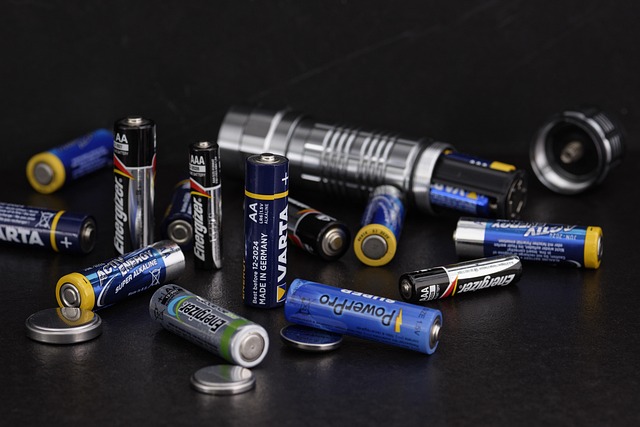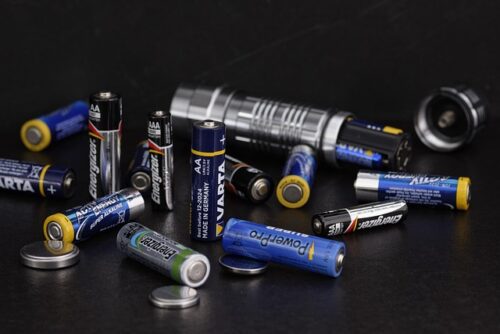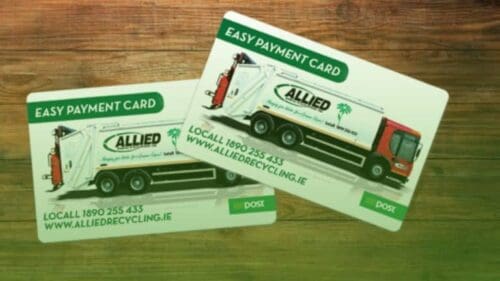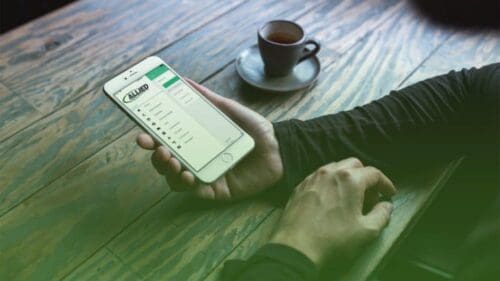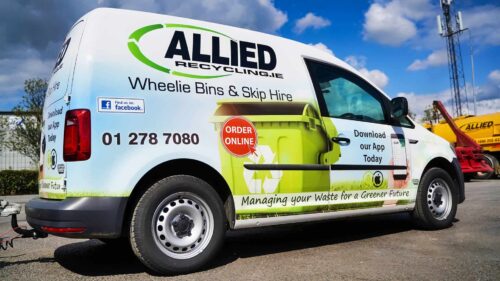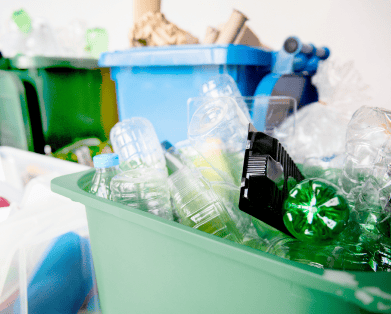A Complete Guide for Allied Recycling Customers
Household waste can be confusing — especially as more products now come with built-in or rechargeable batteries. Putting the wrong items in your black, blue, or brown bin can lead to contamination, extra charges, and even serious fire risks.
To help keep your home and our recycling facilities safe, here’s a simple, accurate guide on what goes in each bin, with a major focus on the safe disposal of batteries.
Why Batteries Should NEVER Go in Any Household Bin
Ireland is seeing a huge rise in everyday items powered by batteries — toys, e-bikes, vapes, headphones, kitchen gadgets and more. But batteries are one of the most dangerous items placed in household bins.
Why batteries are a problem
- They can cause fires inside bin trucks, your wheelie bin, and waste facilities.
- Lithium batteries can explode when crushed, which happens during waste processing.
- Chemicals inside batteries can leak into soil and water if disposed of incorrectly.
The correct way to dispose of batteries
All batteries should be brought to:
- Local shops (all retailers that sell batteries must accept them for recycling)
- Civic amenity sites / recycling centres
- WEEE Ireland collection points
This includes:
- AA/AAA batteries
- Lithium batteries
- Phone batteries
- E-bike/e-scooter batteries
- Button-cell batteries
- Batteries inside vapes
If it has a battery — it MUST NOT go in your black, blue, or brown bin.
What Goes in Your Bins?
Black Bin – General Waste
| Permitted | Prohibited |
|---|---|
| General refuse | Hot ashes |
| Nappies | Glass |
| Ashes (cooled) | Papers |
| Hoover contents | Plastic |
| Heavy construction | |
| Garden Waste | |
| Electrical items | |
| Furniture | |
| Batteries | |
| Demolition materials |
Blue Bin – Recycling
| Permitted | Prohibited |
|---|---|
| Newspapers | Glass |
| Magazines | General refuse |
| Food & Drink cans | Napkins / Paper towels |
| Rigid plastics | Carrier bags / refuse sacks |
| Cardboard | Wrappers |
| Tetra pak cartons | Styrofoam |
| Coffee cup | Batteries |
| Aluminium foil/ trays | *No black bags – clean dry loose only |
| *Contaminated bins will not be emptied |
Brown Bin – Food & Compost Waste
| Permitted | Prohibited |
|---|---|
| Cooked & raw food | Plastic & plastic bags / liners |
| Peelings & leftovers | Metal |
| Coffee grands | Glass |
| Tea bags & leaves | Ashes |
| Paper napkins | Washing machine sheets |
| Grass cuttings | Hoover contents |
| Garden waste | Candle wax |
| Fabric | |
| Medicine | |
| Plasters | |
| Rocks & gravel | |
| Animal waste | |
| Personal hygiene products | |
| Contaminated garden waste | |
| Cardboard |
Please bring all batteries to a WEEE drop-off point or any battery collection box.
Where Should Electrical Items Go?
Electrical items (even small ones) should never go in household bins.
Bring them to:
✔ Recycling centres
✔ WEEE Ireland drop-off points
✔ Any shop that sells electrical items (they take old ones for free)
This includes:
- Toys with batteries
- Vapes
- Phones
- Remote controls
- Hairdryers
- Kitchen appliances
If it plugs in or takes a battery — it’s WEEE, not household waste.
A Growing Issue: Hidden Batteries in Everyday Items
More products now include hidden lithium batteries, such as:
- Bluetooth speakers
- Electric toothbrushes
- Power tools
- LED candles
- E-scooters & e-bikes
- Vape devices
- Kids’ toys and gadgets
- Rechargeable kitchen tools
If it feels heavier than expected, charges with a cable, or lights up — it probably contains a battery.
How You Can Help Keep Your Community Safe
Here are three easy steps every household can take:
1. Check before you bin
If the item has a battery or a plug, it must go to a WEEE collection point, not a household bin.
2. Store used batteries safely
Keep a small box or jar at home for used batteries until you can bring them to a recycling point.
3. Never put batteries in your blue, brown, or black bin
Even one lithium battery can cause a fire in a collection truck.
Recycling properly keeps costs down, improves safety, and helps increase Ireland’s overall recycling rates. As battery-powered products continue to grow in popularity, it’s more important than ever to keep batteries and electrical items OUT of household bins.
If you need local information on battery drop-off points or recycling services, Allied Recycling is here to help.

